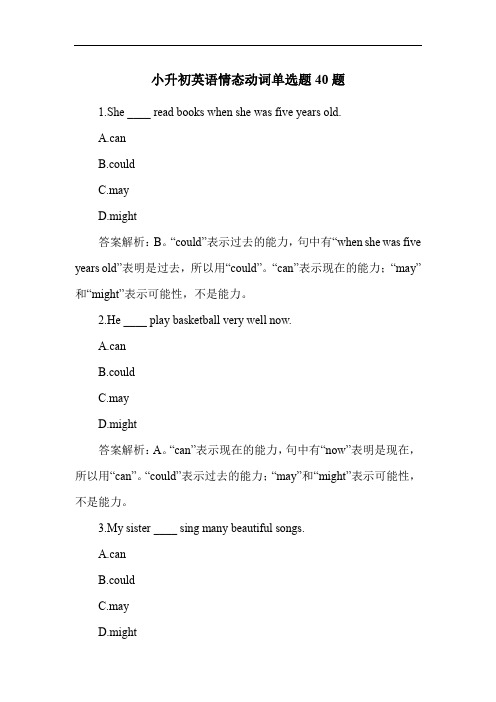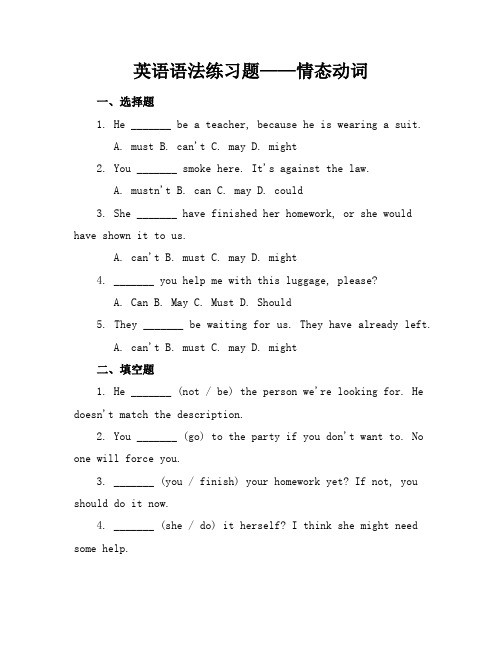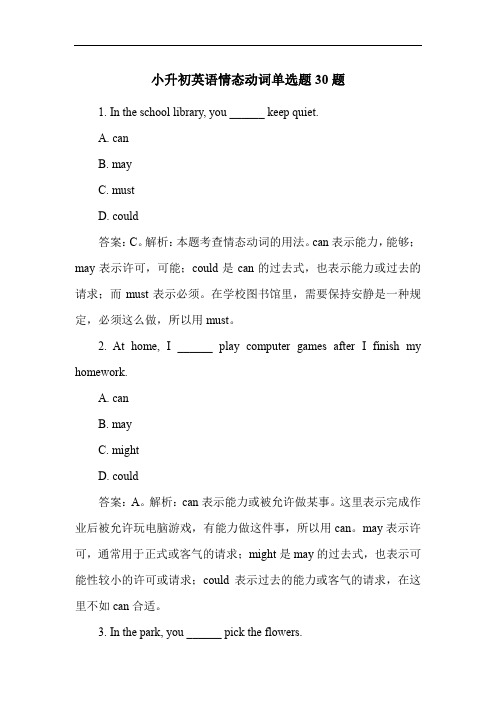2017小升初英语语法:情态动词练习题
(完整版)小升初情态动词练习题

(完整版)小升初情态动词练习题小升初英语情态动词专项练习题1. _____ you ready?(A) Are (B) Have (C) Will (D) Can2. ____ here early?(A) Will he (B) Was he (C) Did he be (D) Were he3. I ___ happy about the price of eggs.(A) am't (B) am not (C) do not (D) won’t4. Since last year I____ him only once.(A) have seen (B) have been seeing (C) see (D) was seeing5. Donald ___ sixteen tomorrow.(A) is being (B) going to be (C) shall be (D) will be6.I ___ the story at all.(A) don't like (B) like(C)am fond of(D) would like7.I would rather ___ than play now.(A) to study (B)am studying(C) study(D) studied8.I'd rather you ___ anything about it for the time being.(A) do (B) didn't do(C)don't (D) didn't9.The car___much money.(A) not cost (B) not have cost (C) isn't cost (D) didn't cost10. I ___ like to eat fish. (A) am (B) have (C) do (D) be11. ___ repeat the question?(A) Shall I (B) Will I (C) Would you like that I (D) Do you want that I12. My teacher knows more than ___.(A) my uncle knows (B) my uncle does (C) they know (D) they don't know13.He___to meet us at the station, but didn't see us.(A) did go (B) did went (C)goes (D) had14.Not only ____us light.(A) does the sun give (B) the sun gives (C) gives the sun (D) the sun does give15. ____ you tell me what has happened? (A) May (B) Must (C) Can (D) Could16. Anne___tomorrow.(A) can sing (B) can to sing (C) is going sing (D) going to sing17.You___hand it in at once, you may hand it in tomorrow.(A) needn't (B) may not (C) can't (D) must not18.Tell the boy that he ___ in the river.(A) swims (B) swim (C) swimming (D) to swim19.Joan___play on Saturday. (A) going to (B) can (C) is going(D) can to20.Susan and I can go to the lecture ___.(A) but neither can Charles (B) and so Charies can(C) but Charles can't (D) and Charles also can21. "That must be a mistake." "No it a mistake."(2)(A) must not be (B) needn't be (C) cannot be (D) would not be22. You ___ be more careful next time. (A) have to (B) may (C) must(D) had to23. I hoped ___ my letter.(A) her to answering (B) that she would answer(C) that she answer (D) her answering24.What___for you? (A) shall I do (B) I may do (C) can I do (D) must I do25.___ I water the trees on Tuesday? No, you needn't.(A) Can (B) Must (C) May (D) Shall26. It is high time that we lunch,(A) have (B) had (C) would have (D) will have27. You___to the meeting this afternoon if you have something important to do.(A) needn't to come (B) don't need come (C)don't need coming (D) needn't come28. It ___ rain tomorrow. (A) can (B) must (C) should (D) may29. I ___finish this before I go.(A) must (B) do (C) may (D) shall30. The meeting begins at eight o'clock. We ____ be late.(A) mustn't (B) needn't (C) may not (D) can not31. ___ you be here at eight o'clock tomorrow morning?(A) Would (B)Should (C) Can (D) Could32. It ___ be difficult to learn Japanese.(A) shall (B) must (C) should (D) need33. ___ I have a talk with the Party Secretary now?(A) Will (B) Did (C) May (D) Can34. "Did your brother break the window?" "He ___ have done it."(A) will not (B) is (C) may (D) can35. May we in the halls?(A) smoke (B) will smoke (C) to smoke (D) smoking36. I'm not sure that I'll go to the concert. I ___ go.(A) may (B) did (C) did not (D) am37. Since it is already midnight, ___.(A) had better leaving `(B) ought to have leave(C) should take our leave (D) might as well leave38. She doesn't answer the doorbell. She___be asleep.(A) ought to (B) might (C) must have (D) should39.Our teacher had one strict rule. She said that all the students___to class on time.(A) came (B) might come (C) must come (D) must have come40. ___ I ask your name? (A) Can (B) Could (C) Should (D)Might41. ____ you be happy!(A) May (B) Can (C) Must (D) Would42. John studied hard that he___ the examination.(A) will pass (B) may pass (C) passes (D) would pass43. "Must we come tomorrow?" "___ .”(A) No, you can't (B) No, you needn't (C) No, you must (D) No, you may44. Must I go with you? No, you ___.(A) mustn't (B) can't (C) needn't (D) may not45. You____ lesson, though we have it on Thursday.(A)mustn't...needn't (B)needn't ...mustn't(C) mustn't...mustn't (D) needn't... needn't46. He___ go there.(A) dare not (B) dare not (C) dares not to (D) does not dare47. "You___read that article if you don’t want to.”(A) needn't (B) mustn’t (C)haven't (D) can’t48. You___afraid of any difficulties.(A) need not to be (B) need not (C) don't need (D) need not be49. You___see him, but I must.(A) haven't (B) can’t (C) mustn't (D) needn’t50. To succeed in a difficult task, ___.(A) one needs to work hard (B) to work hard is needed(C) you need be a hard-working person (D) to work hard is what one needs。
小升初英语:情态动词专项练习题附答案

小升初英语:情态动词专项练习题附答案1.I told Sally how to get here。
but perhaps I should have written it out for her.2.-There were already five people in the car but they managed to take me as well。
-It XXX.3.It's nearly seven o'clock。
Jack must be here at any moment.4.Johnny。
you mustn't play with the knife。
you could hurt yourself.5.XXX was able to get out.6.-When can I come for the photos。
I need them tomorrow afternoon。
-They should be ready by 12:00.7.-XXX while in New York。
-Oh。
did you。
You should have stayed with Barbara。
I shared XXX with you to help you prepare for the English entrance exam for r high school。
In the first sentence。
I suggested that I should have written out the ns for Sally。
In the second sentence。
I used "couldn't have been" to XXX sentence。
I used "must" to XXX。
I reminded Johnny not to play with knives。
小升初英语情态动词单选题50题

小升初英语情态动词单选题50题1. Tom can play basketball well. But he _____ play football.A.canB.can'tC.mustD.mustn't答案解析:B。
“can”表示有能力做某事,“can't”表示没有能力做某事。
前半句说Tom 篮球打得好,后半句转折,说他不会踢足球,所以选B。
2. Mary _____ sing many beautiful songs. She is very talented.A.canB.can'tC.mustD.mustn't答案解析:A。
“can”表示有能力做某事,这里说Mary 能唱很多好听的歌,说明她有唱歌的能力,所以选A。
3. I _____ draw pictures when I was five years old.A.canB.can'tC.couldD.couldn't答案解析:C。
“could”是“can”的过去式,表示过去的能力。
这里说我五岁的时候能画画,所以选C。
4. He _____ speak three languages. That's amazing!A.canB.can'tC.mustD.mustn't答案解析:A。
“can”表示有能力做某事,这里说他能说三种语言,说明他有这个能力,所以选A。
5. We _____ play computer games all day. It's not good for us.A.canB.can'tC.mustD.mustn't答案解析:D。
“mustn't”表示禁止,我们不能整天玩电脑游戏,对我们不好,所以选D。
6. She _____ dance gracefully. Everyone likes her performance.A.canB.can'tC.mustD.mustn't答案解析:A。
小升初英语情态动词单选题40题

小升初英语情态动词单选题40题1.She ____ read books when she was five years old.A.canB.couldC.mayD.might答案解析:B。
“could”表示过去的能力,句中有“when she was five years old”表明是过去,所以用“could”。
“can”表示现在的能力;“may”和“might”表示可能性,不是能力。
2.He ____ play basketball very well now.A.canB.couldC.mayD.might答案解析:A。
“can”表示现在的能力,句中有“now”表明是现在,所以用“can”。
“could”表示过去的能力;“may”和“might”表示可能性,不是能力。
3.My sister ____ sing many beautiful songs.A.canB.couldC.mayD.might答案解析:A。
“can”表示现在的能力,没有时间提示词,但根据语境可以判断是现在的能力。
“could”表示过去的能力;“may”和“might”表示可能性,不是能力。
4.The boy ____ swim across the river last summer.A.canB.couldC.mayD.might答案解析:B。
“last summer”表明是过去,“could”表示过去的能力。
“can”表示现在的能力;“may”和“might”表示可能性,不是能力。
5.I ____ draw pictures when I am free.A.canB.couldC.mayD.might答案解析:A。
“when I am free”表明是现在,“can”表示现在的能力。
“could”表示过去的能力;“may”和“might”表示可能性,不是能力。
6.She ____ play the piano when she was only six.A.canB.couldC.mayD.might答案解析:B。
小升初英语专项-情态动词

小升初专项提优精品试题情态动词一,选择方框内的情态动词并用其适当形式填空1.-I have an apple pie, please? -OK. Here you are.2. Look at the sign. It says the museum closes at 5: 00. We leave now.3. -Must I arrive here at 7:00 tomorrow?-No, you It's too early.4. Look at the sign. We start campfires here.5. Time is up. You stop writing now, children.6.- we go to see a film this Friday?-That sounds great.7. -Does your friend walk there?-I'm not sure. He drive there.8. -Have you decided where to spend your summer holiday?-Not yet. We go to Hong Kong.9. You have already tried your best, so you don't to worry too much about the exams.10. Which club you like to join, football club or chess club?二、选择填空。
( )1.- I take a look at the menu?-Sure. Here you are.A. MayB. ShouldC. Shall( )2. You always finish your work on time, Jason.A. CanB. ShouldC. need( )3. This book _____Tom's. I can see Anna's name on it.A. might beB. may beC. can't be( )4.- I borrow your crayons?-OK. Here you are.A. MustB. MayC. Need( )5. - Bob, shall we go to see a film today?-Sorry, I'm afraid I can't. You ask Peter.A. NeedB. mayC. must( )6. -Have you decided what to do tomorrow?-Not yet. We go fishing tomorrow.A. MayB. shouldC. must( )7. -What birds do? -They can't swim.A. CanB. can'tC. must( )8. Boys and girls, you not play with fire. It is dangerous.A. MustB. mayC. can( )9. You brush your teeth twice every day.A. NeedB. shouldC. may( )10. - Dad, can I go to the party tonight?-Sure, but you come back home before 9 o'clock.A. CanB. mustC. may三、按要求改写句子,每格限一词。
英语语法练习题情态动词

英语语法练习题——情态动词一、选择题1. He _______ be a teacher, because he is wearing a suit.A. mustB. can'tC. mayD. might2. You _______ smoke here. It's against the law.A. mustn'tB. canC. mayD. could3. She _______ have finished her homework, or she would have shown it to us.A. can'tB. mustC. mayD. might4. _______ you help me with this luggage, please?A. CanB. MayC. MustD. Should5. They _______ be waiting for us. They have already left.A. can'tB. mustC. mayD. might二、填空题1. He _______ (not / be) the person we're looking for. He doesn't match the description.2. You _______ (go) to the party if you don't want to. No one will force you.3. _______ (you / finish) your homework yet? If not, you should do it now.4. _______ (she / do) it herself? I think she might need some help.5. _______ (we / leave) now, or we'll be late for the meeting.三、改错题1. She can't have finished her homework. She was playing outside just now._______ can't _______2. You mustn't go to the party without invitation._______ mustn't _______3. He might not be at home because I saw him at the supermarket._______ might not _______4. Can you help me with this problem, please?_______ Can _______5. May you pass the exam easily?_______ May _______四、翻译题1. 他一定知道这个秘密,否则他不会表现得这么奇怪。
小升初英语情态动词单选题30题

小升初英语情态动词单选题30题1.You_____speak English very well.A.canB.mustC.shouldD.would答案解析:A。
“can”表示能力,“你能把英语说得很好”。
“must”表示必须,“你必须把英语说得很好”不符合日常场景;“should”表示应该,“你应该把英语说得很好”也不太符合此处语境;“would”表示意愿,“你愿意把英语说得很好”也不合适。
2.She_____play the piano when she was only five.A.canB.couldC.mayD.might答案解析:B。
“could”表示过去的能力,“她在只有五岁的时候就能弹钢琴”。
“can”表示现在的能力,不符合过去时态;“may”和“might”表示可能性,不是能力。
3.He_____swim across the river. It's very dangerous.A.canB.mustC.shouldn't答案解析:C。
“shouldn't”表示不应该,“他不应该游过这条河,很危险”。
“can”表示能力,但此处强调危险不应该游;“must”表示必须,“needn't”表示不必,都不符合语境。
4.We_____read books to learn more knowledge.A.canB.mustC.shouldD.will答案解析:C。
“should”表示应该,“我们应该读书来学习更多知识”。
“can”表示能力;“must”表示必须,语气太强硬;“will”表示将来,都不太符合此处语境。
5.The baby_____walk yet.A.can'tB.mustn'tC.shouldn'tD.needn't答案解析:A。
“can't”表示不能,“这个婴儿还不能走路”。
“mustn't”表示禁止;“shouldn't”表示不应该;“needn't”表示不必,都不符合此处语境。
小升初英语情态动词单选题30题

小升初英语情态动词单选题30题1. In the school library, you ______ keep quiet.A. canB. mayC. mustD. could答案:C。
解析:本题考查情态动词的用法。
can表示能力,能够;may表示许可,可能;could是can的过去式,也表示能力或过去的请求;而must表示必须。
在学校图书馆里,需要保持安静是一种规定,必须这么做,所以用must。
2. At home, I ______ play computer games after I finish my homework.A. canB. mayC. mightD. could答案:A。
解析:can表示能力或被允许做某事。
这里表示完成作业后被允许玩电脑游戏,有能力做这件事,所以用can。
may表示许可,通常用于正式或客气的请求;might是may的过去式,也表示可能性较小的许可或请求;could表示过去的能力或客气的请求,在这里不如can合适。
3. In the park, you ______ pick the flowers.A. can'tB. may notC. mustn'tD. couldn't答案:C。
解析:mustn't表示禁止,在公园里摘花是不被允许的,是一种禁令,所以用mustn't。
can't表示没有能力或不可能;may not 表示可能不;couldn't是can't的过去式,这里不是过去时态的语境,所以mustn't最合适。
4. When we are at school, we ______ run in the hallways.A. can'tB. may notC. mustn'tD. might not答案:A。
解析:can't表示不被允许,没有能力做某事。
- 1、下载文档前请自行甄别文档内容的完整性,平台不提供额外的编辑、内容补充、找答案等附加服务。
- 2、"仅部分预览"的文档,不可在线预览部分如存在完整性等问题,可反馈申请退款(可完整预览的文档不适用该条件!)。
- 3、如文档侵犯您的权益,请联系客服反馈,我们会尽快为您处理(人工客服工作时间:9:00-18:30)。
PI L
pepeeu si pjeq ”」o/v\ oj g pjeq ”」o/v\ oj speeu euo v
■ 來印肿0屮卩e ui peeoons o丄j_
j.upeeu ' j.upeeu Q hujsnuu ' ^ujsnuj o
j.ujsnuj ' ^upeeu g j.upeeu ' ^ujsnuj v
Aepsjnqi
uo ;i eAeq e/v\ q6noqj f uosse| eq; ssiuu no人g
jou Aeuu noA 'ON a Lujsnuu noA 'ON O
j.upeeu noA 'ON a lueo noA 'ON V
^MOJJOLUOJ euuoo 9M jsn|/\| g
P|no/\/\ a ]sn|/\| o ueg g 血l/\l V jAddeq eq noA p
eAee| ||0M se ;q6iuj Q o八旳」no 科印pinoqs o
eAee| eAeq oj jq6no g 6uiAee|」e^eq peq v
■9M ^qBiupiuu Apeej|e si ;i eouis £eAeq jq6no Q OHqbno o pinoqs g eAeq pinoqs v
Aeqt 1|e/V\—MOU 0] dn ”」o/v\ o屮qsiuij jou
eAeq Aeqi ■一•乙
Aeuu Q ueo o ||eqs g HIM V jopop 0屮p^jse | ..乙囘!dsoq eqi eAee| eq uecjM..' L 潴E裁回"厚卑斟•液里里亞似長ZLO乙
peAe|d eAeq pinoqs Q 6uiAe|d ueeq eAeq jsnuu o 6uiAe|d eq jsnuu g 6uiAe|d eq pinoo v
euj peuoqd noA ueq/v\ pjeA o屮ui siuue; e/\/\■一
■6UIUJOLU siq; euoqd eq; uo noA je6 j < upinoo | jAq/\/\■一zt
isnuj Ije^eq jou peq Q Pinoqs Jou」e;;eq peq o
p|no/v\ Jeqje」jou p|no/v\ g eAeq Ije^eq } (ueAeq v enoA f dee|se 1 冋| ueq/v\ dneuu e>jeM no人•乙L
1 < ueo Q io6 1 < ueAeq o j < ueAeq at < uop v
乙noA ‘0] 106 eAeq noA 川q 'MOJJOLUOJ ”」OM OJ eAeq j < useop en ' L L
I IQUS a I ll!M 0 I jeqj JUBM noA OQ a I 样屮o”!l
noA p|no/\/\ v 乙noA」oj」oop eq; uedo 0 L
lojjuoo eq ueo Q 6UI||OJJUOO eq jsnuu o
peiiojjuoo eq pinoqs g IOJJUOO pinoqs v
- sun6pueq 样屮QOj e|doed euuos 6
SSIUJ
lieqs Q 1!科Pinoqs o ssiuu p|no/v\ g iiej HIM V
uie6e 心p|no/v\ | ' | eseo u| g
speeu euo jeq/v\ si pjeq ”」o/v\ o] Q uosjed 6UI>|JOM pjeq e eq peeu noA o
pejeAooej jeA ](useq eqs」oj f uoos os 囘!dsoq eq; eqs 6L
pe/weiAej eAeq pinoqs Q MeiAej }q6iuj o MeiAej pinoqs g MeiAej pinoo v
;q6iu jse| sespjexe eq; e/v\ ssen6 |■一;q6iu jse|
soijeuueqjeuj eq; passed euo ON■一8L
ueo Q mBiuu o pinoqs g j < upeeu v
II! ueeq eAeq en一
川」OM o] euuoo ] < upip ui|」|/\| Aq/v\」epuo/v\ |一j_ [
p|no/v\ Q pinoo o isnuu g pinoqs v ^Aeuu jse| seuuijeujos ueeq eAeq * jnq f||e/v\ *」equueujej j ueo |-一I|BM jeej6 o屮OHUOM 9M ueq/v\」equueujej ||i;s noA OQ-■一g [ pinoi|s Q Aeuu o isnuu g pinoo v snq Aq euuoo
eAeq no人^Aneey■一uen人OG OUJ pe6jeqo」eAup eq; pue ixej Aq ejeq euueo |一和pue^e i < upinoo Q pepuewe eAeq j ueo o pueue j ujsnuu g pepueue eAeq jouAeuu v 7! an 9S|e ApoqAue pip」eq;ie|\|■一ainpe| eqj je
uuiq ees j < upip e/\/\一视
膽E%團QB翠事•滚里里圣似ZLO乙
vaaoo os-9 L aoooas L-L L
aaovoL-9 avava S-L
ueAup eAeq j < upinoqs Q ueAup eAeq jsnuu o
ueAup eAeq j < ueo g ueAup eAeq j < upeeu v MOUS
AAeeq eq; q6nojqj ejen Ae/v\ eq; ||e |
^Aepoj
6ui;eeuj ou se/v\ ejeq; euu ||e; noA j < upip Aq/\/\ o乙
]< upeq Q 9Aeq j < upeeu
0 ye| eAeq j < upinoqs g ye| eAeq j < up|no/v\ v。
